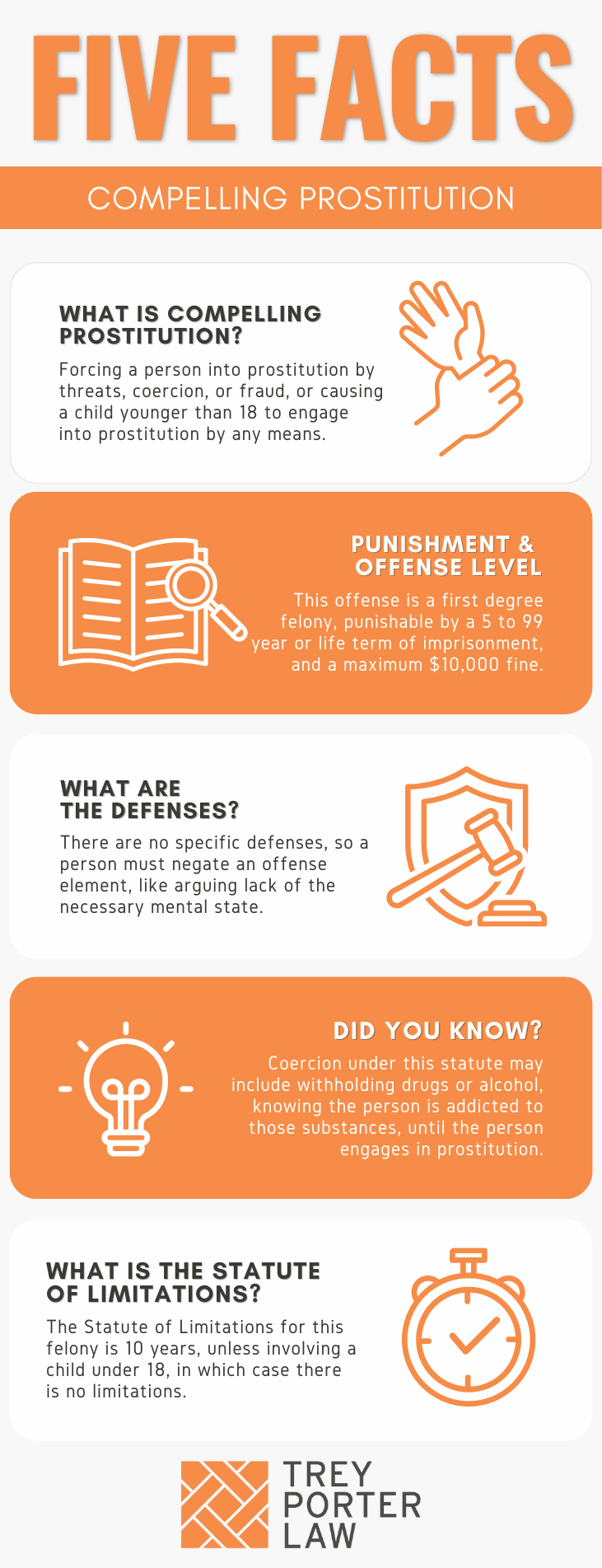WHAT IS COMPELLING PROSTITUTION IN TEXAS?
The Texas law against compelling prostitution prohibits forcing another to engage in prostitution, or causing a child under 18 years of age to engage in prostitution, with or without force, threats, or coercion.

WHAT IS THE COMPELLING PROSTITUTION LAW IN TEXAS?
Tex. Penal Code § 43.05. COMPELLING PROSTITUTION.
(a) A person commits an offense if the person knowingly:
(1) causes another by force, threat, coercion, or fraud to commit prostitution; or
(2) causes by any means a child younger than 18 years to commit prostitution, regardless of whether the actor knows the age of the child at the time of the offense.
(b) An offense under this section is a felony of the first degree.
(c) If conduct constituting an offense under this section also constitutes an offense under another section of this code, the actor may be prosecuted under either section or under both sections.
WHAT IS THE PENALTY CLASS FOR COMPELLING PROSTITUTION IN TEXAS?
Compelling prostitution is a first degree felony, punishable by five to 99 years or life in prison.
WHAT IS THE PUNISHMENT RANGE FOR COMPELLING PROSTITUTION IN TEXAS?
The punishment range for compelling prostitution, a first degree felony, is five to 99 years or life in prison, and up to a $10,000 fine.
WHAT ARE THE PENALTIES FOR COMPELLING PROSTITUTION IN TEXAS?
A person convicted of compelling prostitution is not eligible for probation, so a guilty finding by a judge or jury will result in a prison sentence between five and 99 years or life. The law creates an exception for a person who compelled prostitution as a victim of human trafficking, who may receive probation after a conviction for a period of up to ten years.
A person charged with compelling prostitution may be eligible for deferred adjudication from a judge for up to ten years, after a plea of guilty or nolo contendere (“no contest”).
WHAT ARE THE DEFENSES TO COMPELLING PROSTITUTION IN TEXAS?
The statute does not authorize specific defenses to compelling prostitution. A person accused thereof may attempt to negate at least one of the elements the State must prove at trial.
- Can minors under 14 be compelled to commit prostitution in Texas? There is not a clear answer from Texas appellate courts as to whether a minor under 14, who is legally incapable of consenting to sex, can be compelled to commit prostitution.In Turley v. State, the Fourteenth Court of Appeals reversed a defendant’s compelling prostitution conviction for pimping out his four-year-old daughter. According to the court, because the four-year-old was legally incapable of consenting to sex, she was unable to commit prostitution, and thus could not be compelled to do so. The Texas Court of Criminal Appeals granted the State’s petition for discretionary review, and will conduct an independent legal analysis.
WHAT IS THE STATUTE OF LIMITATIONS FOR COMPELLING PROSTITUTION IN TEXAS?
There is no limitation period for compelling prostitution if the person is accused of causing a child under 18 to commit prostitution. If the person is accused of causing another to commit prostitution by force, threat, coercion, or fraud, the limitation period is ten years.
COMPELLING PROSTITUTION IN TEXAS
Compelling prostitution is forcing another to engage in prostitution by threats, coercion, physical force, or fraud. Coercion may include withholding drugs or alcohol, knowing the person is addicted to those substances, until the person engages in prostitution. For a child under 18, the burden to show one compelled prostitution of the minor is a much lower one. Merely influencing the minor to engage in prostitution may constitute compulsion.
TEXAS COMPELLING PROSTITUTION COURT CASES
The case law regarding compelling prostitution in Texas shows the broad interpretations courts give this statute.
- In Kelly v. State, the defendant was convicted of compelling prostitution, and trafficking a child for the purpose of compelling prostitution. She allowed multiple people, including M.M., a minor, to engage in prostitution in her home. She would also find men for M.M., translated for spanish-speakers, and M.M. would give the defendant a small amount of her earnings. The defendant argued on appeal that she merely provided an opportunity for M.M., a willing minor, to prostitute herself. But the appellate court affirmed, explaining the statute only requires influencing prostitution.
















